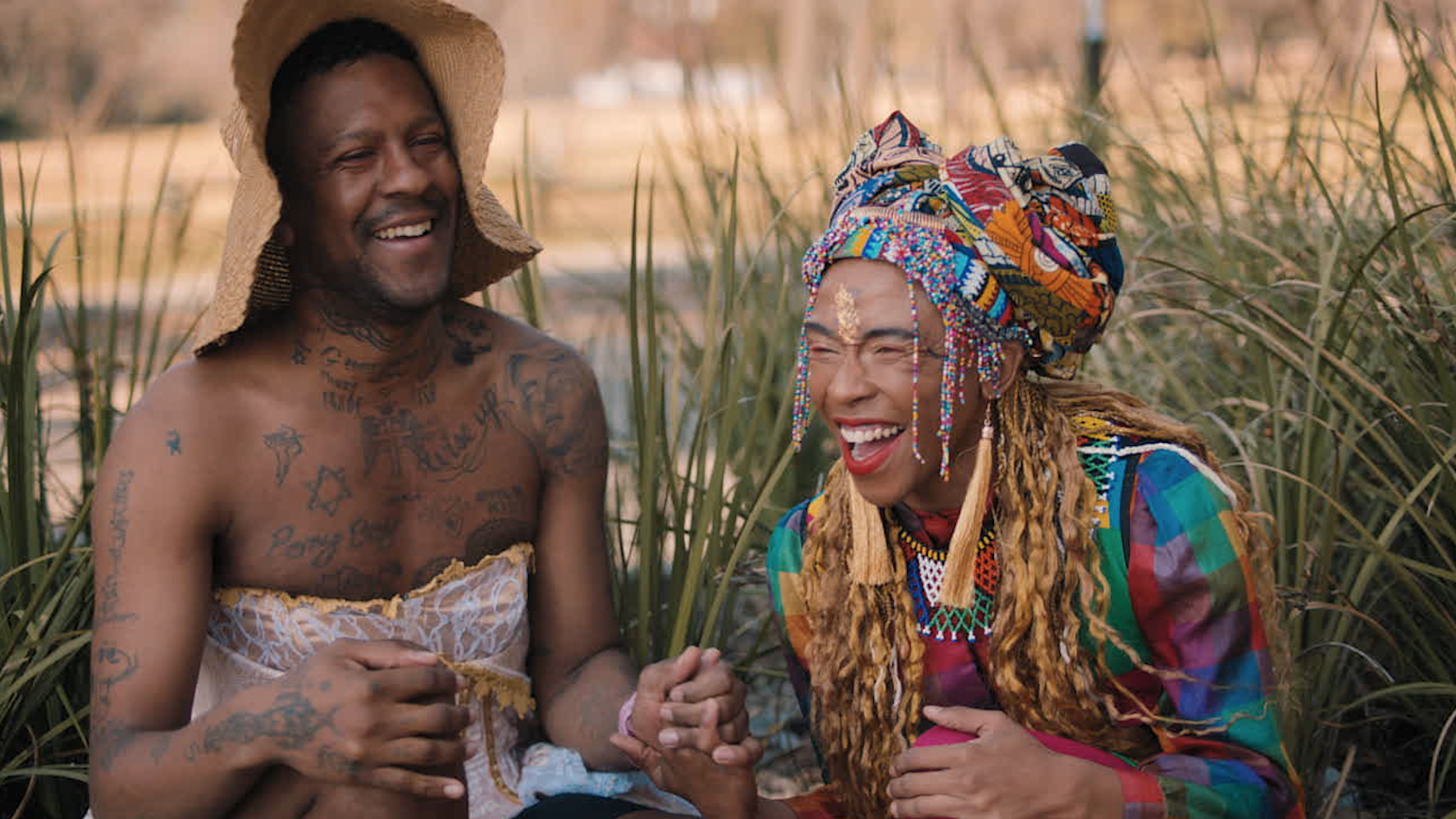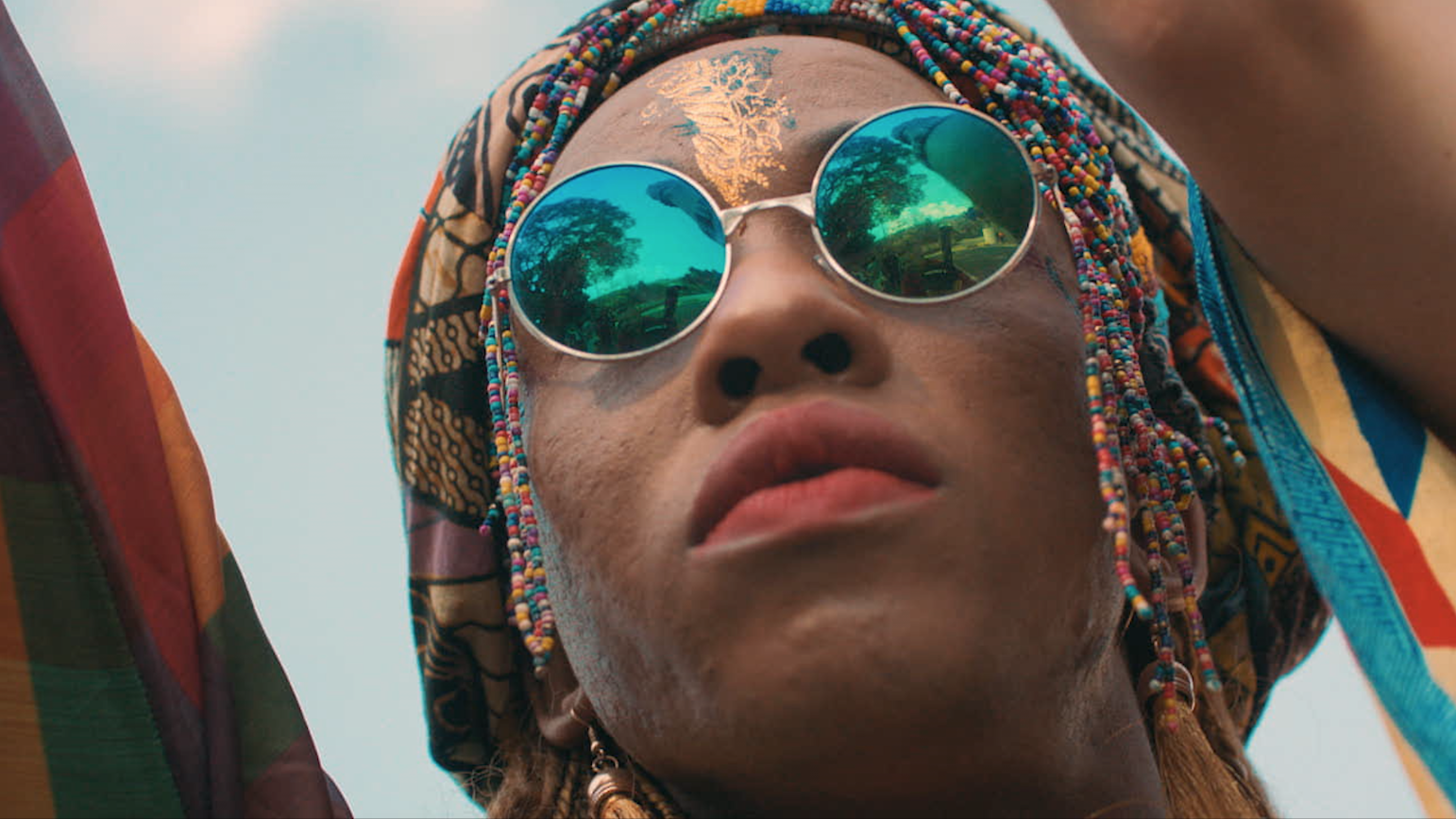There are many reasons why Johannesburg is being heralded for its creativity right now. The music is hot, the style is unique, the art offers a raw perspective. As with many of the world’s most culture-shaping underground movements, the kids behind this are shunning outdated notions of gender and sexuality. At the heart of this creative rebellion is Umlilo. Born and raised in Jo’burg, Umlilo couldn’t be pinned down to one thing, though is perhaps best known as a musician. “Fierce, queer and gender bending”, the music Umlilo creates sounds like a revolution. “My perspective is particularly unapologetic, queer, black, South African and non-binary.” While queer South African music has a way to go before reaching the mainstream, Umlilo’s two EPs, Aluta and Shades of Kwaai, have won fans across the world, with Noisey calling the latter “a spacious mix of smooth vocals and melancholic synths, like Kelis back when she was left of centre.”
As i-D present a new series Out of This World, exploring the underground youth culture of South Africa, we had a chat with Umlilo, to find out more about what life is like as a queer artist and performer in Johannesburg.
Hi Umlilo, can you tell us a little bit about your background and upbringing?
I grew up in Johannesburg, just as South Africa was becoming a democracy. I’ve always been in school and church choirs. About seven years ago I started producing and making my own music for fun as Siya Is Your Anarchist, a post-apocalyptic musical alter-ego. After a while I started performing as Umlilo because I had outgrown the very noisy, punk narrative of the post-apocalypse.
Could you describe what Umlilo sounds like to someone who has never heard your music?
My music is an exploration of different musical genres and sounds. I call it “dubbed future kwaai” — it’s fierce, queer and gender bending; a mix masala of booty popping kwaito, house, gqom, maskandi, electro, hip hop, punk, avant-garde baroque pop, bounce, alt R&B, rock and everything in between. I sing in a number of different languages and I explore different voices. The topics I write about are mostly political and personal, and include anything from capitalism to club culture. I believe that the personal is political especially for someone is gender non-conforming and exists on the outskirts of societal norms.
What musicians are you excited by right now in South Africa?
My favourites at the moment are Babes Wodumo, BCUC, DJ Lag, Vox Portent, Annalyzer.
What about musicians from around the world?
I’m in love with Cardi B, Rebecca Ubuntu, Gloria Groove, Jay Boogie, Sevdeliza, Shea Coulee and Parri$.
What’s the best and worst part about being a young person in South Africa?
I think the best part of being a young South African is that there is our real sense of strength and power. We are a confident, unapologetic group that is ambitious, super woke and aware of our constitutional rights. We live in a diverse society with 11 official languages, many cultures, races, genders and this influences our perspective of the world. We could really be the modern day land of hope for other places if we got our shit together in time. The music, art, film, writing and pop culture in SA is really ruled by the youth narrative.
The worst thing about being young in South Africa is that, because our current government has failed us dismally with corruption, we are most likely to be unemployed even after studying towards a career. There is a what we call a Rainbow Nation disillusionment in our youth culture where most of us are angry that the inequality gap continues to grow and everything we were promised when the country became a democracy (with one of the world’s most progressive constitutions), has not materialised. Our education system sucks, our state entities are on the brink of collapse, our currency is not doing well, we are all in debt and we lack the resources to really reach our full potential. So while you are able to have ideas and be creative, there are no resources supporting that hustle.

What’s life like for a queer person in Johannesburg?
Jo’burg is a tough, sprawling city that is known as the City of Gold after the mining rush in the early 1900s. It was also a city where everybody was separated according to race and language during Apartheid and those structures still exist making queer life more a challenge. The city itself is rundown and going through gentrification, so there are mini cities all over that have become their own hubs of culture and entertainment. If you are rich, you most probably will live an amazing queer life, but if you are not, it’s a bit of a challenge. I feel like Jo’burg is a lot more homophobic because of its Afrocentric male heteronormativity as a dominating force. It has so many people who have come with their own prejudices from other parts of Africa, so it’s not easy for queers to thrive day-to-day. At the same time, Jo’burg has a rich queer history that balances all negativity that might come from its current problems. People create their own safe spaces and are still not deterred by all of these challenges. The younger generation seems to be a lot more open minded and gender fluid.
You lived in Cape Town for a few years. What’s life like for a queer person there?
Cape Town is a land of opposites. It is advanced in embracing queers in some ways and has been the queer capital of Africa for a long time. There is amazing drag, techno and mardi gras. But there are also major cracks within the city. It’s the city with the highest cases of corrective rape of lesbians, so it’s difficult to say. If you’re white, gay and male you’ll probably think it’s the best city in the world but if you black, female and lesbian or trans you might have a different view of the city.
What do you think needs to change in order for LGBTQI acceptance to progress in South Africa?
I think we have such a lazy government that think a piece of paper or book is enough to move a society forward. We need more visibility, campaigns educating people about xenophobia, homophobia, corrective rape etc., and to make the links between those forms of hatred and racism. If people understand that their prejudice is the same as what the Apartheid government was doing to POC people in SA for so many decades, maybe it will begin changing their perspective. We need informed police officers who do not harass or laugh at people reporting incidents. We need dedicated people who constantly push the ethos of living together in harmony and it needs to be enacted in our public spaces, on our radio stations and TV channels.
Can you tell us about Rainbow Riots?
Rainbow Riots was originally a Gay and Lesbian organisation in Uganda. It is also now an album released in July featuring queer artists like myself from all over the world, including Uganda, Malawi, South Africa and Jamaica. The album echoes songs against homophobia, violence, inequality and neocolonialism. Stash Crew and I have a song titled Mad As Hell on the album and the song explores the anger and frustration that comes with being a queer body where people from all over feel entitled to abuse and exploit you for their own gains, this includes people within the queer community as well.
What can we next expect from you?
I have a few singles coming out between 2017 and 2018. I have been working on tons of new material with exciting artists from all over the world so I have an EP in the pipeline. In the next year, I will be going on several more tours worldwide, shooting more music videos and I’m also working on my debut album, which is super exciting.
